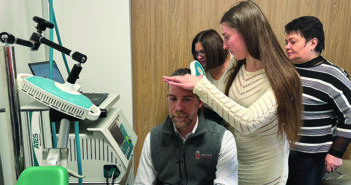A health center cares for its at-risk community by linking health and human services.
Myechia Minter-Jordan, MBA ’94 MD’98 was practicing at The Dimock Center in Roxbury, MA, when one of her long-time patients admitted that she had begun drinking heavily. She felt she couldn’t leave her dangerously abusive relationship for fear of ending up on the streets. With a phone call, Minter-Jordan got her patient admitted to Dimock’s inpatient detox program, which was next door.
Minter-Jordan joined Dimock in 2007 as chief medical officer, and took the helm as CEO in 2013. She says her mother, a nurse for 30 years, inspired her to want to help vulnerable populations in her career, one patient at a time. Today, she says, that patient who entered Dimock’s detox program—and went on to receive job training at one of the center’s residential programs—is employed and has her own home. Whenever she sees Minter-Jordan, she tells her, “Dimock saved my life.”
Minter-Jordan enjoys seeing patients, but in her role as CEO, she says, she is “making a larger impact on the system and helping many more patients and clients.” After completing the Sinai Hospital Program in Internal Medicine at the Johns Hopkins University School of Medicine, Minter-Jordan was an attending physician and instructor of medicine at Johns Hopkins Medical Center. She then completed an MBA at the Johns Hopkins School of Professional Studies in Business and Education, an experience that taught her “to look at quality improvement and processes in order to improve care,” she says.
The Dimock Center has 400 employees serving more than 17,000 clients in four economically disadvantaged suburbs of Boston. Dimock defines health care more broadly than many institutions; for example, it considers education a key component of successful long-term outcomes. Its Early Head Start and Head Start programs serve almost 400 children, and each year some 200 adults earn GED diplomas.
All patients seen by a pediatrician or internal medicine physician are screened for substance or mental health issues. Dimock offers “the full continuum of substance abuse services,” both inpatient and outpatient, Minter-Jordan says. Because behavioral health services are fully integrated and colocated, “we have better outcomes and better patient and provider satisfaction,” she says. “We can take care of your diabetes better, because we are taking care of your depression.”
Dimock runs on a combination of federal funds, reimbursable health care transactions, and donations; one of Minter-Jordan’s near-term goals is to gather the data to demonstrate its value to stakeholders. She says Dimock’s outcomes exceed those of state and national institutions on prenatal care, childhood immunizations, asthma management, cancer screening, HIV linkage to care, and a number of other important indicators.
Attracting and retaining dedicated physicians is another ongoing challenge, especially in light of the salary requirements of those with large medical school loans to pay. As a federally funded institution, Dimock offers a physician loan repayment program, and there are other rewards, Minter-Jordan says. “What drives many of our physicians is the ability to practice in a team-based environment,” she says.
Minter-Jordan lives not far from Dimock, in West Roxbury, with her husband, Lawrence, a high school special educator, and their two daughters, ages 8 and 10. She credits Lawrence with making it possible for her to balance work and family life. “I would not be successful in my career without having a husband who is an excellent father and whose schedule is more flexible and consistent than mine,” she says.




